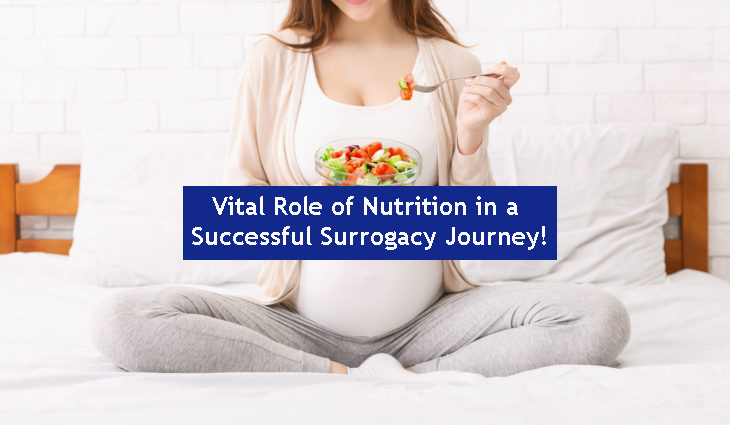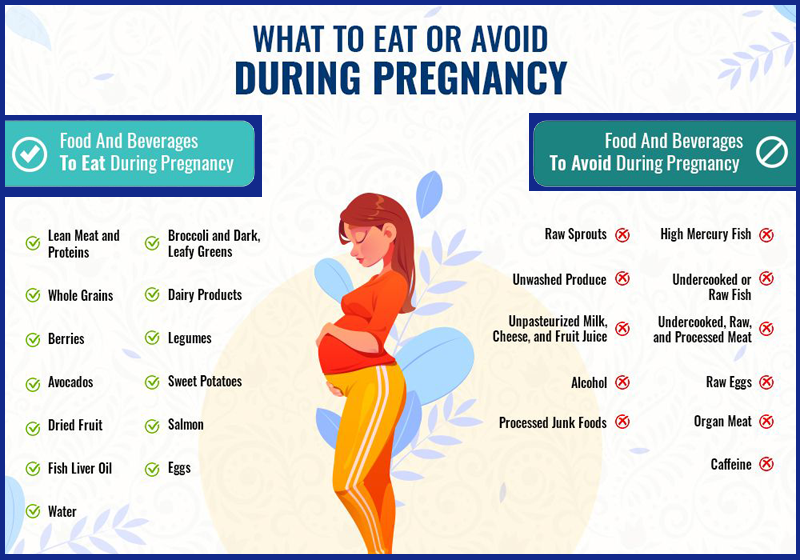Understanding the Vital Role of Nutrition in a Successful Surrogacy Journey!
Surrogacy pregnancy is often deemed risk-free by the medical specialist. Still, as with any pregnancy, the success of the surrogacy journey depends on various factors, with nutrition being one of the key parts. Also, just like a plant needs the right kind of soil and supplements to flourish, a developing child requires the proper supplements for growth and well-being. In the following parts of this blog, we will talk about how pregnancy nutrition plays a vital part in guaranteeing a smooth and effective surrogacy journey.
Pregnancy Nutrition Guide:
1. Setting the Stage for a Healthy Pregnancy
As a couple sets out on a surrogacy journey, they should make the right plans and decisions regarding nutrition. Moreover, a well-balanced diet can help improve the quality of the egg and sperm during donation, leading towards more healthy embryos. For the surrogate, having a strong wholesome diet guarantees her body is ready to support the development of the infant.
2. Nutrition and Baby’s growth
The nine months of pregnancy are a period of quick development and change for the child. That said, each cell, organ, and system depends on supplements from the mother’s diet. Moreover, calcium supports bone health, iron is significant for blood production, and folic acid helps tackle anticipated neural tube issues. Also, guaranteeing that the surrogate is following a healthy diet rich in fundamental supplements can play an essential part in the baby’s growth.
3. Better immune system
A strong immune system is the body’s defence element against sicknesses and diseases. Moreover, a nutrient-rich diet, like fruits, vegetables, and whole grains, contains cancer prevention agents and vitamins that help in bettering immunity. On the other side, a well-nourished surrogate is less likely to witness health issues. Moreover, this is best for the health of the baby and the success of the pregnancy.
4. Improving the Surrogate’s Well-being
The demands of pregnancy can be saddled on a woman’s body. That said, appropriate nutrition can help in overseeing common pregnancy complications like sickness, tiredness, and mood swings. Also, when the surrogate feels her best, she can give the best environment for the child to develop.
5. Readying the Body for Childbirth
Childbirth is a once-in-a-lifetime moment, and a well-nourished body can better adapt to the physical demands of labour and delivery. That said, basic supplements like protein help in repairing tissue. Moreover, omega-3 fatty acids can help in diminishing inflammation in the surrogate’s body. Also, by focusing on nutrition, a surrogate can prepare her body for a healthier delivery.
6. Better post-delivery recovery
After giving birth, the surrogate’s body begins the recovery process. That said, appropriate nutrition can quicken recuperating and recharge nutrition stores. Moreover, eating a healthy diet helps reestablish nutrition levels. Besides, they make it simpler for the surrogate to recover faster after the delivery process.
7. Preparing the body for the Breastfeeding process
In case the surrogate and the intended parents concur on breastfeeding, nutrition needs to be prioritized. Also, breast milk composition is affected by the mother’s diet. Besides, by getting along with a nutrient-rich diet, the surrogate ensures that the breast milk gives the baby with essential supplements and antibodies.
How to ensure the right nutrition for the surrogate?
Perfectly balanced diet: You must focus on the calorie count that incorporates lean proteins, whole grains, fruits, vegetables, and dairy or dairy options. That said, these food options give basic supplements required amid pregnancy.
Supplements: Prenatal vitamins can be a useful addition to cover any dietary gaps. Also, you must counsel a specialist before getting started with any supplements.
Hydration: Drinking plenty of water supports the expanded blood volume amid pregnancy and helps in absorption and supplement retention.
Avoid smoking and alcohol: Constrain caffeine and dodge liquor, tobacco, and other harmful substances that can contrarily affect the baby’s growth.
What’s ideal for post-pregnancy nutrition?
Post-pregnancy nutrition is pivotal for the recovery of the mother and, in the case of breastfeeding, for giving the infant basic supplements. That said, proper nutrition can help address the physical and emotional demands of parenthood, while promoting recovery.
1. Calories
Breastfeeding moms frequently require an extra 300-500 calories per day compared to their pre-pregnancy consumption. Moreover, this helps them bring the required energy into the body to produce milk. On the other side, non-breastfeeding moms do not require these additional calories. Still, they must focus on a nutrient-rich diet to support the recovery process.
2. Protein
We all know how protein is basic for repairing and building tissues, particularly after childbirth. So, we must incorporate lean meats, eggs, pulses, beans, lentils, tofu, eggs, and dairy items into our diet.
3. Calcium
Calcium is imperative for bone health and milk generation. Hence, you must incorporate dairy items, invigorated plant-based milk, leafy green vegetables, and sesame seeds.
4. Iron
Childbirth can lead to a deficiency of Iron. Hence, to recharge stores and avoid the chances of anemia, do include red meat, eggs, angel, lentils, beans, tofu, spinach, and iron-fortified cereals.
5. Omega-3 fatty acids
These support the health of the baby’s brain and eyes. Also, Sources you can get Omega-3 fatty acids from salmon, chia seeds, flaxseeds, and walnuts.
6. Fiber
Fiber is really important for digestion health, a common post-pregnancy concern. Hence, you must incorporate whole grains, fruits, vegetables, lentils, and seeds in your diet
7. Liquids:
Water is particularly crucial for breastfeeding moms because it supports milk generation. Hence, you must drink plenty of water, and incorporate other liquids like milk, organic teas, and soups.
8. Vitamins
Most of the Vitamins, especially Vitamin D, are critical for bone health and immunity. That said, the best sources of vitamins incorporate dairy items, fish and most importantly, Sunlight. On the other side, Folic acid is also important for breastfeeding moms. Hence, you should incorporate leafy greens, beans, citrus fruits, and wholesome foods
Also, Vitamin C helps in tissue repair and boosts immunity. Besides, citrus fruits, strawberries, bell peppers, and tomatoes are great sources.
9. Restrain Caffeine
If breastfeeding, constrain caffeine because it can pass into breast milk and may impact the child’s health. Also, it’s for the most part prescribed to constrain the consumption of caffeine during the pregnancy period.
10. Avoid alcohol
In case you opt to intake liquor while breastfeeding, do so in moderation and consider the timing. Also, it’s more often than not suggested to hold up for at least 2 hours after drinking liquor before getting started with breastfeeding.
11. Proceed with Pre-natal Vitamins:
Numerous healthcare experts suggest that modern-day mothers should take pre-birth vitamins, particularly in case they’re breastfeeding.
12. Restrain from Sugary stuff
While you may get the craving, particularly when energy levels are low, you should avoid sugar intake. Moreover, even if you can’t cut it down completely, you must minimize its intake.
13. Always go by your body’s demands
Your hunger pangs and energy demands may vary during a certain day. So, It’s basic to focus on your body’s demands and eat when you’re hungry.
14. Look for support
Consider counselling with a nutritionist or lactation specialist in case you have particular concerns about your diet or even your child’s health.
So, we can say that the post-pregnancy period could be a time of recovery and change. This is where giving your body with the right nutrition can make this shift smoother. Besides, it may support your health, and guarantee your infant gets the right growth and development.
Final words
In a nutshell, we can quote that nutrition isn’t just about eating the proper diet. Instead, it’s also about making an environment where a child can flourish and develop. Also, the success of a surrogacy journey intertwines deeply with the surrogate’s health, and nutrition plays a fundamental part in this process.
By guaranteeing that the surrogate keeps up with a healthy diet and gets the required supplements, you can ensure a healthy pregnancy. Also, whether you’re an intended parent or a surrogate, keep in mind that what’s taken care of at present can help build a happy future. Become Parents will help you in your surrogacy journey.




